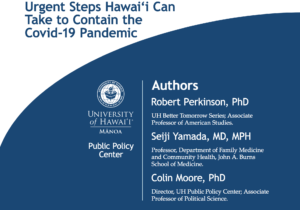The University of Hawaii Public Policy Center released a paper on April 15 called Crush the Curve, addressing what Hawaii needs to do relative to public health to restart the economy and reduce the impact of COVID-19 in the state. The introduction says Hawaii must take urgent and aggressive steps to contain the COVID-19 Pandemic. They note the state has already been aggressive in requiring a 14-day quarantine on all incoming passengers–the first state to do so. And Hawaii has also been aggressive in testing, with more than 20,000 tests done so far. Hawaii has geographic isolation on its side, plus military and hotel infrastructure which could be utilized in the fight against COVID-19. But they argue that more is needed, in testing, contact tracing, and isolation of those infected.
The authors are Robert Perkinson, PhD, UH Better Tomorrow Series, Associate Professor of American Studies; Seiji Yamada, MD, MPH, Professor, Department of Family Medicine and Community Health, John A. Burns School of Medicine; and Colin Moore, PhD, Director, UH Public Policy Center, and Associate professor of Political Science.
The authors say that the key to successfully containing Covid-19 is to press Hawaii’s advantages and mitigate our weaknesses. Containing the virus requires not a new policy approach but implementation of traditional public health practices. And the authors say Hawaii must be far more aggressive in its approach–now, not later.
The summary of the paper says in order to contain the Covid-19 pandemic, which will not only save lives but is necessary to restart the economy, Hawai‘i needs to redouble and accelerate its public health response. In addition to better physical distancing, the state government needs to:
–Significantly increase testing for SARS-Cov-2, the causative agent of Covid-19 disease;
–Augment its contact-tracing capacity by adding significant personnel;
–Isolate every individual who tests positive in hotel rooms at government expense. Hotel capacity should also be deployed to house front-line, at-risk workers and other groups of especially vulnerable persons.
The authors note that delay in implementing the steps poses a significant danger, since there is no immunity, no vaccine, and no treatment for COVID-19.
The authors believe Hawaii should not go along with less aggressive policies being implemented on the mainland of the United States, but instead emulate regional governments like South Korea, Taiwan, Singapore, Hong Kong, and New Zealand, which have at least initially contained the virus through aggressive public health responses.
The paper with significant references is on the website for the UH Public Policy Center.
